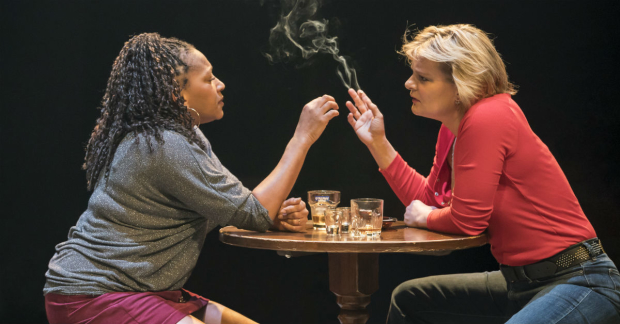Review: Sweat (Donmar Warehouse)
Lynette Linton directs Lynn Nottage’s prescient Pulitzer Prize-winning play

© Johan Persson
When it first appeared in New York in 2016, days before the election of President Trump, Lynn Nottage's fine play was acclaimed as a prescient explanation of why he attracted the white working class vote in such numbers. In two and a half years of research in Reading, Pennsylvania, the poorest city of its size in the US, she had spotted something that most political commentators had missed: the distorting impact of poverty on human lives.
Seeing it now, in the midst of a chaotic and disorderly Brexit, driven by issues that don't touch the lives of so many people damaged by the policies of austerity, it has a more universal wisdom to offer. Its empathy with the dispossessed and the power of its passion on their behalf makes it an absorbing and moving cry from the heart.
But it is also a skilful piece of theatre, one which landed Nottage her second Pulitzer Prize. Nottage's first stroke of genius, having spent so long probing real people's lives in the present day, is to set her drama in 2000, as President Bush was elected, and (in an introduction and a brief coda) in 2008 during the financial crisis that further destroyed people's economic stability and thus their hopes. In Lynette Linton's British production, a TV plays quietly in the background of the bar where most of the action is set; its silent pictures a constant ironic commentary on how far removed national politics are from life on the streets.
Her second is to show not tell. There are occasional moments when her dialogue becomes expositional, but for the most part she involves us with great skill in the lives of three women, friends for decades, who work at the local steel plant and who spend their leisure time drinking in the local bar. In the prologue, we meet their sons Chris and Jason, talking to a probation officer; we know something terrible has happened and wait for its unfolding.
But when we first meet Tracey (Martha Plimpton), Cynthia (Clare Perkins), and Jessie (Leanne Best) they are reeling drunkenly around Mike's Bar. The scene is beautifully designed by Frankie Bradshaw with just the right level of detail and rusted steel girders holding up the sides, to remind us that the women and the city owe their prosperity to an industry that is dying. Barman Stan (gentle Stuart McQuarrie) and Columbian bar help Oscar (Sebastian Viveros) watch on; Stan dispenses advice, Oscar silently tends to them.
Over the next two hours we come to know them and their families and watch helplessly as the bonds between them are torn apart when Cynthia becomes the first black woman in the plant to be promoted from the assembly line, and Tracey puts her promotion down to minority favouritism. When Cynthia, in her new management role, is forced to lock out her friends as the plant imports immigrant workers who are willing to do the job cheaper, the scene is set for tragedy.
That summary makes the play sound schematic and rather bald. Yet its strength lies in its complexity. Characters you are fond of behave badly; people take out their anger and frustration on the wrong targets; the borders between friendship and hate, between tolerance and racism, between love and violence are shown to be terrifyingly narrow, easily permeable.
Over it all lie two themes: an aching nostalgia for the community and prosperity of the past, but also a myopia and a stasis that afflicts people in the present. "Nostalgia is a disease," says Stan. Chris, a man with options, closes them down; Cynthia's agony is all the greater because she has tried to better herself, to extend her horizons, yet now finds herself in an impossible bind. Tracey's emergent racism is a shock, but Cynthia too plays the card of separation not togetherness. "You don't know what it's been like to walk in my shoes."
The detail and compassion of the writing is matched by performances of great depth, all directed by Linton with control and sensitivity. Plimpton, the former child star of The Goonies, is like an electric shock as Tracey, the life and soul of every party who by the close has revealed both a dark ugliness and an awful lonely lostness. Best is a delicate, wandering drunk. As Cynthia, Perkins finds all her character's confusions but also her pride; Osy Ikhile's Chris acutely tracks a journey from boyish hope to despair. Wil Johnson is moving as his father, lost in a haze of drugs but still wise.
In the end, the play is both gripping drama but also a plea for understanding and support, for people to stand together and not turn on one another when the real villains of the piece are the politicians and multi-nationals who have abandoned them, losing track of what is valuable in the pursuit of profit. It is a profound cry of agony and insight on behalf of the dispossessed and as strong a Christmas message as you could possibly wish for.




















